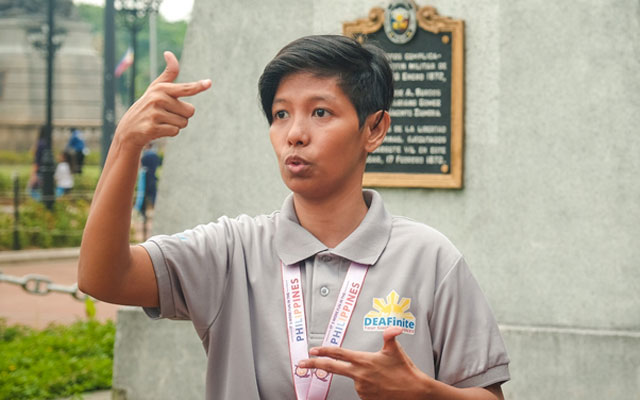
An organisation in the Philippines that leads tours for the deaf is planning to expand its specialised service beyond Manila, with the country’s tourism making gradual strides towards inclusivity.
Launched last year, DEAFinite Tour Guiding Services today has 13 deaf guides accredited by the Department of Tourism, who take tourists with special needs on itineraries covering historical attractions in Manila including Intramuros, National Museum, Fort Santiago and Rizal Park.

“Once our existing services are more stable, we hope to have more deaf tour guides in different regions,” said DEAFinite Tour Guiding Services’ president, Jamie Aquino.
Herself deaf, Aquino told TTG Asia that the company sees demand coming from deaf local and foreign tourists including those from Italy, the US and South Korea. Filipino students enrolled in deaf schools have also been signing up for the tours.
In line with the Philippines’ thrust for barrier-free tourism and inclusive tourism industry, DoT has teamed up with local players with the aim of grooming more tour guides who are skilled in sign language and trained to understand the needs of persons with disabilities. DoT is collaborating with Intramuros Administration, Office of Industry Manpower Development, and the De La Salle College of Saint Benilde’s School of Deaf Education and Applied Studies, alma mater of the 13 DEAFinite tour guides.
To be DoT-accredited, deaf tour guides have to pass rigorous training and complete a seven-day training programme based on DoT’s Community Tour Guiding module.
Apart from knowledge and skills improvement training, DoT occasionally invites DEAFinite to facilitate lectures and take part in forums on accessible tourism, such as during the PATA Annual Summit 2019 in Cebu last May.
“We are improving our services and trying to expand (our customer base). Our Facebook page helps us find the clients,” Aquino added.
As it takes steps to make its services available to more deaf tourists, Aquino said one of the difficulties is that sign language is not universal. “The deaf have different sign languages. We use the International Sign Language we are familiar with and learn some foreign signs,” Aguino said.
Aquino said the tourism ecosystem is gradually shaping up to be more inclusive and deaf-friendly. Elsewhere in the tourism industry, hotels, restaurants and malls are increasingly hiring the deaf. Naming some examples, she said hotels with deaf employees include the New World Manila Bay, Shangri-La Makati and Sofitel Philippine Plaza. Some deaf-friendly restaurants include A&J Cafe, Elait, Overdoughs, Teriyakiboy, and Subway.



















